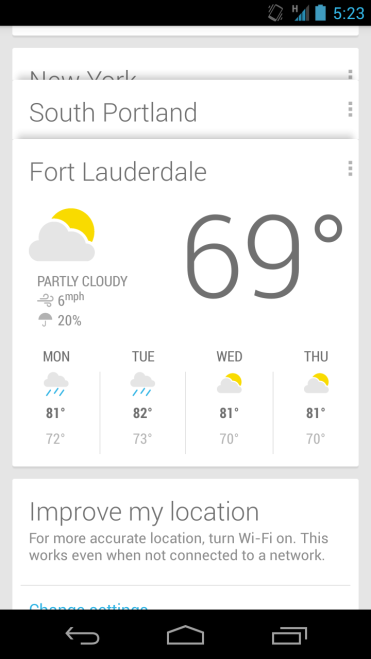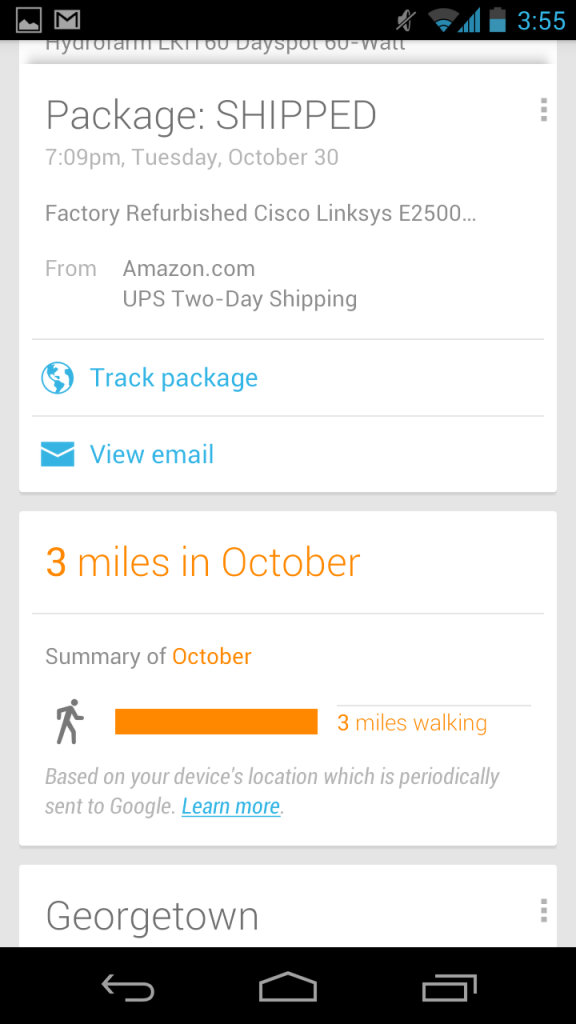Every year is a different mix of technologies. Some are here to stay, others are not long for the world. But for future reference, if nothing else, I wanted to snapshot a few things that were very useful for me in 2012, where useful means they impacted my day to day life. I’ve also tried to focus on lower visibility items: it would be true to say, for example, that the Nexus 7 I acquired to replace my Xoom impacted my life day to day, but there are hundreds of articles about tablet usage. Same with cable cutting and the Roku.
This is a list instead of things you may or may not have heard of, but might prove useful if they’re new to you. The latter two are Android-centric, but the first is available to anyone. Enjoy.
Plex
Of the technologies I started using in 2012, none had a wider impact on our house than Plex. For a variety of reasons ranging from cost to the fact that I dislike TV in general, Kate and I have never had cable in the house. Most of her shows are available online via Hulu and other channels, and the only thing I care about – the Red Sox – is available via the radio. And MLB.tv, when I’m traveling.
But watching movies together was always a trial. Either we had to first decide on and then hunt down a DVD, which were stored haphazardly across four or five different nylon sleeves, or it was Amazon Video or Netflix – both of which posed problems. First of all, we live on an island where we have only one broadband provider – Fairpoint. Who isn’t very good. Instead of being “27 times faster than dial-up,” our connection at home was regularly more like two. The other issue is that our TV’s old enough to not have Netflix built in, so we had an old Mac Mini plugged in for the streaming services. Which meant using a keyboard and mouse to queue up movies.
Ridiculous, I know. Anyway, to solve the latter problem we plugged in a Roku, which worked perfectly. But we still had the bandwidth issues. Also, the selection on Amazon and Netflix was imperfect.
Enter Plex. A really marvelous and underappreciated piece of software, Plex is what I’d wanted Google TV to be: a free as in beer home media server software package that does a number of things. First, it provides a clean, 10 foot navigable interface to media – movies, music or TV – that you load into it. Second, it will automatically retrieve metadata such as movie posters, actors/actresses, genre and so on in the background. Third, it will let you organize it into collections: we have one for movies that we find mutually acceptable, for example (it’s a very short list). And lastly, it will stream this content to computers, phones, tablets, TVs, Roku boxes or anything else connected to your network, transcoding it as necessary on the fly. It will even let you stream it remotely. When I’m in Brussels next week, Plex will let me watch movies off of my home server. Isn’t the future cool?
The developers in the audience might also be interested to know that Plex’s new interface is Bootstrap-based, and very well done.
If you’re interested in Plex, here are two posts on how I built what we call sogflix – our local Netflix equivalent: “How to Build Your Own Personal Netflix” and “How I Rebuilt Our Entertainment System Using Plex and Roku.”
Google Now
Over the long term, Google Now is likely to have the most impact on my day to day life, because it’s about putting my data to work for me. And while Google’s really only scratched the surface with Now, even today, the application is enormously useful.
When I’m flying home from Baltimore, for example, it knows from my Inbox what time my flight is, and its status. It also knows from my search history that I like Of Love & Regret – where Ryan and Leigh of Monktoberfest fame work – and thoughtfully provides me with directions there as well as traffic time.
If I’m scheduled to meet a friend for a beer, it provides me directions there and will even tell me when I have to leave to be on time.
Google Now also knows how long it’ll take me to get to work and what time the Red Sox game is on.
From my travel itinerary, Google Now pulls up the weather forecast at each stop along the way.
If I’ve ordered a package, it will track it for me and keep me informed of how much I’ve walked or cycled over the past month (for the record, I only had my phone for a week that month).
The only thing I need to know to use Google Now is how to turn it on. There is nothing else to learn. Google Now is easily the best new feature to Android in the last release, and possibly since it launched. While the privacy implications will undoubtedly scare off some potential users, at this point I’m as comfortable with Google on that score as I am anyone. And the ability to outsource weather, package tracking, flight status, day to day schedules and so on to software that can leverage my data alongside that from external sources is quite compelling. Day to day, Google Now is a godsend, and projecting forward a few years it’s likely to become only more useful.
MightyText
At some point over the last year, my friends gave up texting me and started texting my wife. The latency from my replies was just too high.
Not too long ago, text was actually a great way to reach me. Quick, efficient and not an overrun wasteland like email. But once I got a Nexus 7, it replaced my phone for casual browsing and other tasks at home. Which meant that a text directed to me would wait until I picked up my phone. Which could be hours, or in rare cases a day, later.
So, suboptimal if you’re looking for a quick response. Hence the texts to my wife. A few months ago, however, I was directed to the Android app MightyText. Billed as iMessage for Android, it essentially connects SMS to the desktop and a tablet. When I get a text now, the Chrome extension on the desktop and my Nexus 7 will pop up a notification, and I can reply to the text quickly. Using a real keyboard, no less. MightyText will also notify you when someone’s calling your phone, and display the phone’s current battery level.
But the ubiquitous and device independent access to SMS is the big feature for me. Now I get texts when they come in, rather than hours later. Which may in time lead to less texts from my friends to my wife – we’ll see.
In the meantime, MightyText is a free app. The handset application is on Play here, while the tablet version is here.
Disclosure: There's nothing to disclose. None of the above products were built by clients, nor do I know people personally working on these projects.






